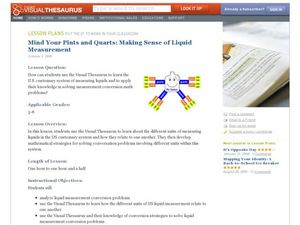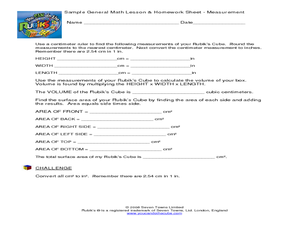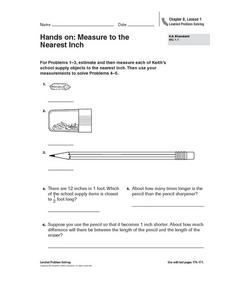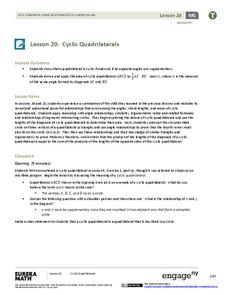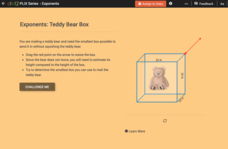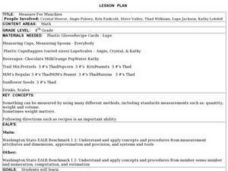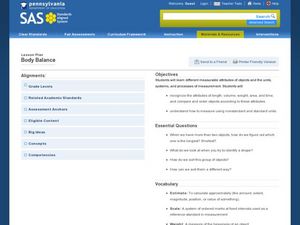Curated OER
Mind Your Pints and Quarts: Making Sense of Liquid Measurement
Students convert among liquid measurement units. In this measurement lesson, students use Visual Thesaurus to gather information about customary units for liquid measure such as cup, pint, and quart, then students practice converting...
Curated OER
Makeshift Measuring Tools
Fifth graders practice measuring items with unique tools. In this length lesson, 5th graders examine several household items and must decide if they want to use a pencil width, piece of paper, or their thumb to measure the item....
Curated OER
Measurement
Learners measure angles, perimeter, area and volume. In this geometry lesson, students define different ways to measure and solve for the perimeter, area and volume of geometric shapes. They analyze and process information to help them...
Curated OER
Standards and Measures
Students conduct a "one-question interview" about standardized tests. They assess two sections of a standardized test that they took or will take this year and write an article for their school newspaper that consolidates their test...
Curated OER
Measuring Units and Tools homework 18.7
In this units and tools used to measure instructional activity, students observe objects, circle the unit needed to measure and circle the correct tool to use. Students circle eight answers.
Curated OER
Hands On: Measure to the Nearest Inch
In this units of measurement worksheet, students estimate and then measure each of the 3 pictures to the nearest inch. Students then use the measurements to solve 3 story problems.
Curated OER
My Shoe: Measurement Activity
In this measurement worksheet, students will put their shoe on their paper and trace around it. Then students will color in blank unifix cubes to match the length of their shoe.
Curated OER
Pancakes, Pancakes!- Measuring
Students estimate measurements in real world problem situations. For this estimation lesson, students read the book Pancakes, Pancakes and estimate how many cups equal a pint, quart, and gallon. Students test their estimations by...
National Nanotechnology Infrastructure Network
Is Measuring an Art or a Science?
Not only do future engineers learn the difference between accuracy and precision, they also get some hands-on experience using different measuring tools.
EngageNY
Cyclic Quadrilaterals
What does it mean for a quadrilateral to be cyclic? Mathematicians first learn what it means for a quadrilateral to be cyclic. They then investigate angle measures and area in such a quadrilateral.
CK-12 Foundation
Whole Number Exponents: Teddy Bear Box
Five questions—multiple-choice, fill in the blank, and discussion—make up an interactive that challenges scholars to mail a teddy bear using the smallest box possible without squishing it. A box with movable sides allows mathematicians...
EngageNY
End-of-Module Assessment Task — Precalculus (Module 1)
A transformational assessment determines how far pupils are advancing toward mastering complex and matrix standards. The assessment checks the learners' understanding of linear transformations, complex numbers and the complex plane,...
Illustrative Mathematics
Regular Tessellations of the Plane
Bringing together the young artists and the young organizers in your class, this lesson takes that popular topic of tessellations and gives it algebraic roots. After covering a few basic properties and definitions, learners attack the...
Utah Education Network (UEN)
Insides and Outsides
Give small groups handfuls of unit cubes and then dare them to build as many rectangular prisms as possible using only 12 cubes. This engaging activity serves as an introduction to the volume of solid figures. In addition to volume,...
Curated OER
By the Pound
Agriculture surrounds us every day; incorporate measuring tools into a study of Oklahoma's agricultural industry! Small groups read an informational text (included) before visiting stations where they investigate prices of various...
Curated OER
Discovering Pi/Welcome to Pi Day
Students explore pi. In this circle measurement lesson, students define and identify radius, diameter, circumference, and perimeter. Students work in groups to measure several plastic lids and record their findings. Students compare the...
Curated OER
Measuring in Inches
First graders discover that there are two types of standard measurement using a ruler: centimeters and inches. They use the inches side to measure pipe cleaner "worms"; straigthening them out and laying them on the end of the ruler with...
Curated OER
Measure Objects To the Nearest Half Inch
In this standard measurement worksheet, 3rd graders measure pictures of 5 objects to the nearest half inch. They measure pictures of items such as scissors, a pencil, and a crayon.
Curated OER
Internet Measurement
Students become familiar with how to get information from the Internet. In this math and technology lesson plan, students measure objects on a measurement sheet found on a web site. They practice using a standard unit of measurement...
Curated OER
Measuring for Cookies
Students explore the concept of baking cookies. In this baking cookies lesson, students work in groups to correctly make a batch of cookies. Students must convert measurements in order to determine the correct amount of ingredients...
Curated OER
Measure for Munchies
Fourth graders are introduced to the various types of measurements. Using a recipe, they practice measuring out the correct amount of ingredients while making the food. They also practice using a scale and following the directions on a...
Curated OER
Body Balance
Examine measurable characteristics of objects to build an understanding of the different ways you can discuss an object's size when comparing it to other objects. After whole group instruction, the class compares and organizes several...
Math Drills
Converting m and mm (C)
Supplement measurement instruction with a 20-problem learning exercise that focuses on meters, millimeters, and how to convert them.
Curated OER
Variance and Covariance: How much to do baseball players really make?
Is baseball really the road to riches? Here, statisticians look at salary data from baseball players and use variance to measure the spread of the data to more accurately answer that question. Note: The salary data provided is from 1994,...


